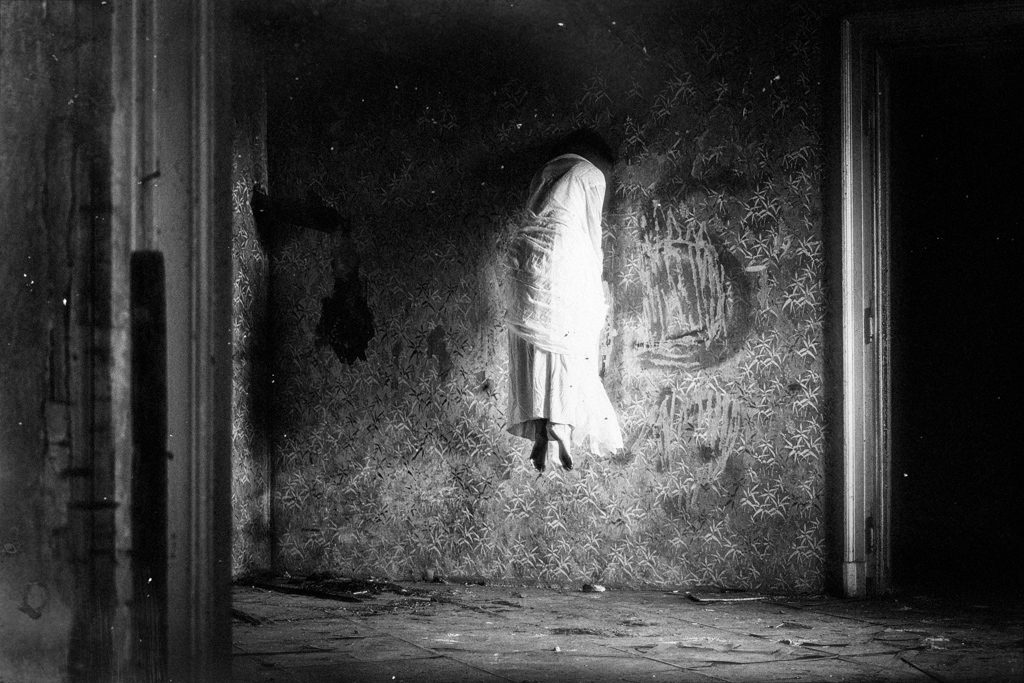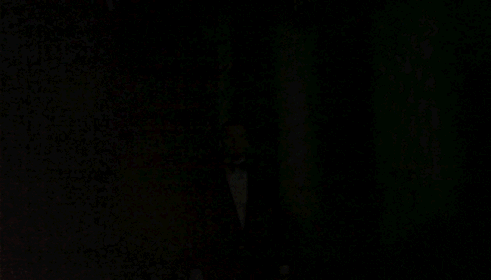She should have died hereafter;
There would have been a time for such a word.
— To-morrow, and to-morrow, and to-morrow,
Creeps in this petty pace from day to day,
To the last syllable of recorded time;
And all our yesterdays have lighted fools
The way to dusty death. Out, out, brief candle!
Life’s but a walking shadow, a poor player
That struts and frets his hour upon the stage
And then is heard no more. It is a tale
Told by an idiot, full of sound and fury
Signifying nothing.-Macbeth
Nestled in the deep dark corners of Chelsea, a faux hotel houses an experience that changed the way people saw theater. Sleep No More (2011), created by Punchdrunk’s Felix Barrett, tells the story of Macbeth (1611) but set in the 20th century. Billed as an “interactive play,” it allows viewers to discover the story at their own pace, breaking the linearity of the story in favor of a more modern form of storytelling. The actors flight from room to room, the audience scrambling after them to inspect all the objects and rooms around them or to watch their wordless performances. Required to wear plague doctor masks and forbidden from speaking, each viewer has their identity and individuality stripped away.
Yet, some audience members proved more compliant than others. It only takes one videogame player in the crowd to really test the limits of the “interactive” label. Kill Screen decided to throw several videogame players into the mix, by bringing the entire editorial team to a showing the night before Kill Screen Festival this past April. At the conference, a panel on horror took place between Barrett and independent game maker Kitty Horrorshow, where they discussed the intimate relationship between theater and games, horror and interactivity. Afterward, I caught up with Barrett to dig deeper into the question of how the increased prevalence of videogames is changing the nature of Sleep No More.
///
KS: I don’t know why—maybe because I knew I was going to interview you, but I went into Sleep No More with this very investigative approach. I wanted to break it. Not break the immersion; I was fully immersed. But I needed to see how far I could take it.
That’s exactly what Kitty [Horrowshow] said.
KS: Really?!
She had the same response. And I think that’s because it’s from a games perspective. I’m not totally a gamer myself, but there’s always that desire to kind of hack a game or try to mod it or find the glitch. It’s all about how you can control it—control someone else’s world. And with theater, it’s just this completely passive experience. It’s two polar approaches. And whatever baggage or cultural background people have informs the way they watch the show.

Macbeth by timechaser via Flickr
KS: I feel that. The minute we got in there—it was me and one other Kill Screen editor in the first room—and we just started ransacking the place like we were in a survival horror game.
Did you get a one-on-one?
KS: I didn’t get a one-on-one. But I got pulled into something with like the drinks at the bar, when a character lays out three drinks—I forget exactly what the context was. I was very overwhelmed. But he poured a drink for one guy, and when the guy went to drink it, the performer slapped it out of his hand. The second guy went to take the drink and he did nothing. Then when he gave the drink to me I had this bizarre freak out where I was so enraptured and so terrified of getting tricked… I literally poured the drink out!
Do you know what I think is really weird? The show’s been on for five years now and the world has really shifted in those five years. So when we first started, it was crazy enough to just have people walking around and not sitting down. Now people are used to that and we need to do more. We didn’t design Sleep No More for people to go against the grain. We designed it so that people would walk slowly with a crowd. And what we’re looking into now for future Punchdrunk shows, like the one we just did in London, is to actually embed more of that gaming mentality and even give the audience the ability to level up. Wouldn’t it be cool if there’s a room that you can’t get into because you’re on level one, but as soon as you’re a level three—[makes an unlocking noise]. It’s optional, so it’s a secret, but if you speak that language, then there’s something there for you. All the technology that wasn’t around five years ago now lets us to do stuff like that.
People review Sleep No More like it’s a game sometimes now. And I played Resident Evil (1996) as a kid, and it’s so informative now. We actually had an away-day with the team where we just played games and looked at the mechanics and said, “Fuck, alright, how would you stage this?” It’s been so revelatory. How would you stage Candy Crush (2012) or Clash of Clans (2012)? How do you take that set of mechanics and make it applicable to the real world?
KS: Wow that’s crazy. Well what I think you already have in common with the game designer is that you both know some secrets about human curiosity. What’ve you learned over the years about how to guide people’s curiosity?
When we were first trying things out in the early years of Punchdrunk, we did a show in the daytime outdoors in this gorgeous summer sun. And it profoundly failed. Because you can’t discover something if you can see it in the distance. Once you get there, it’s like “Oh, well, yeah, that’s what I expected.” What I immediately learned is that you need the shroud of darkness.
KS: Kitty knows something about that too.
Exactly. The base emotion you need to create for curiosity is apprehension. Fear. You can’t be relaxed. When we did a Sleep No More in Boston, the fire department said the lights were too dark. So, the first night, we made them 5 percent brighter and it was a disaster. It fundamentally didn’t work. Because just a couple more notches of brightness and you have people just meandering around like it was a fun little show. It turned into this light, artistic romantic comedy. Curiosity is about the desire to seek out versus the fear of being caught, or the fear of something bad happening.
KS: Right. And in your talk, you described darkness as both threatening and promising. In your opinion, is that curiosity driven by genuine fear or more of the pleasure of fear?
I think it’s equal parts.
KS: What’s interesting is that Macbeth is such a superstitious play already. Lots of fear around it in the theater world. Do you all call it by its name or do you call it the Scottish play?
Well the irony is that we’ve treaded on so many superstitions in that theater that the place is cursed five times over. When we were building Sleep No More, one of the producers brought over a TV spiritualist, a medium. I don’t know why they brought her out. She was quite old, late 70s, and she had a panic attack. She was screaming and had to be physically ejected from the building. “People are gonna die, people are gonna die,” all while borderline frothing at the mouth. I’ve never seen anything like it. She just understood what all the superstitious iconography we had around meant. Half the rooms have things that are literally enticing demons or witches, so if you speak that language it’s quite full on. But it’s not real, is it? It’s theater. So we can say Macbeth because, if we were cursed, it would have happened by now.
Although we did have a ghost in the beginning.

Earthbound Souls by sanna.tugend via Flickr
KS: Explain that please!
The space that we took over used to be the club Bed—it was in an episode of Sex and the City—and it was a lounge where people lay in bed and drank cocktails. There was a rumble and some guy got drunk and a bouncer pushed him up against the elevator shaft. But in a classic horror movie cliché, the doors opened and the elevator wasn’t there and he died. So they closed the space that day and we were the first people to move in three years later. There were loads of weird things. And I really do not believe in ghosts but a lot of the staff refused to do things in certain rooms.
There’s one room in the detective agency on the fourth floor with loads of fans. And when we were rehearsing, the cast would keep saying, “Can you just switch all the lights and the fans off? It’s so hot and windy we can’t work.” So they called the technician and said, “Alright there’s no way the lights and fans will go off anymore because nothing’s plugged in yet.” We went back and started running the show and there were all manner of lights going on and off randomly. We genuinely thought that the explanation was that there was someone living in the building, but no one ever saw them. And then there was one door on the fourth floor that would not stay closed. You’d lock it and it’d pop open. It got to the point where we put a person to guard it, and even then when the shifts changed, the 30 seconds where people weren’t watching over it, it’d open. At the end of the day they had to seal it shut.
KS: I love it.
I’ve got a question for you.
KS: Go for it.
With your gaming mindset, what did you respond to?
KS: Weirdly, I really responded to the tactile experience of it. I just wanted to touch everything.
Did you follow the cast or follow the space?
KS: The space.
That’s the other thing, gamers don’t want to follow rules.
KS: Yeah I didn’t—gamers generally don’t want to be like everybody else. They don’t want to be like the masses.
Exactly. The dream way is that you’d be in there by yourself, like it was a videogame.
KS: Now I’ve got another one for you: How do you train your actors to react to assholes like me—to that gaming mentality?
Well they’re supposed to be looking for the people who are more curious, who deserve it most, so they can have a one-on-one moment with them and give them a key from around [the actor’s] neck that opens secret doors. The actors seek out the people who are really tuned into the rhythm and the tempo, grab their hand, and take them out. That’s the reward. You can literally end up in an embrace with them, feel their breath, be in a position you’ve only ever been in with a lover.

Image by Herman Beun via Flickr
KS: I was really curious about the time period you picked, too.
Well, did you see the scene with the witch and the drum and the strobes?
KS: Yeah, the blood orgy. Sorry—we called it the blood orgy.
It’s interesting because for that scene—you said you tried to break the show. We do too. And that scene is us setting rules and then breaking all of them. So when you build a set in the 30s, people get comfortable with that. Then if, all of a sudden, you’re in a different time and place. Now you fear it again. It’s there to keep you on your toes.
How was the blood orgy for you?
KS: The blood orgy was my favorite. I was leaning in so much that I actually got some of the blood on me. It was great.
Whenever I come into town with a bit of jet lag, that scene always peps me up.
When you look at a naked room, how do you identify the threatening versus the safe spaces?
I think it’s instinctual. It’s literally like I’m a child again.We do a thing with our cast—we rehearse offsite in a studio, then we take them to the space and layer them into the fabric of the world—and the first game we play with them is hide and seek. Three hours of crazy, full on hide and seek where the entire room is super dark. Everything’s in show mode, and the cast is creeping around scaring each other. People go totally rogue. We also give them tasks and one is to console a frightened little boy in the corner and tell him a fairytale. Obviously, there’s no little boy. But you’re in a dark space, and we’re prompting them to fill in the gaps. When I look at a space, I’m trying to find where the bogeyman could be hiding. Where are the shadows a little too dark? Where would I not want to go?
Can I ask you a question?
KS: Yeah.
So as a games person, did you come out more frustrated than satisfied?
KS: No, no, I was very satisfied. I actually left very ashamed. I felt like I’d done it wrong. I felt like I had ruined the experience for myself. I left wanting more.
And did you all stay together?
KS: No, we all split up instantly.
Was there a range of different responses from the team? Did some people reject it? We’ve been trying to think, if we could remake this show for that interactive mindset, how would it be different?
KS: Honestly, I think it might ruin it. The minute you started talking about gamifying it, I hesitated. There’s this beautiful quality of being invisible. Of being completely ignored. As a games person, that felt different and I liked it. I guess all I would change is preparing for that mentality. If I had known I was a ghost more than a participant…
That’s so weird. That’s exactly what Kitty said. She kept referring to the audience as ghosts.
KS: Do you think the internet changed Sleep No More at all? Because, I mean, for one thing, people can just give away all the secrets online.
It’s interesting because our audiences used to be quite lone wolves in the early days. Now, they go as packs. They all meet before, there are fan groups. But everyone has different experiences. Part of the fun is speaking to everyone at the end and finding out what they did, what happened to them. The internet corrals that in a way, but it doesn’t mean the spoilers are out. We’re trying to think of how we could flip the shows we have coming up on their head again by incorporating the virtual. How do we make a digital space dangerous? Or what if the show is just the beginning? It’s that space between the fictional and the real. What happens if you go to the show, then you go home that night, go on the subway, get back home, and then at one in the morning your phone rings, and it’s one of the characters you’ve seen and they say, ”I’m round the corner, come meet me.” Now that is where it gets really dangerous.
KS: I’m gonna tell you right now, I’d be the player that causes lawsuits for you because I am so down. I’m too down.
[Laughing] It could go really wrong. The problem is that, if it’s the real world, how do you as the audience know you’re talking to a performer or not? You could have some crazy guy run up to you and say, “Come back to my place.” I mean so much can happen in the real world. But that’s what’s so exciting about it. It’s profoundly out of control. What I’m trying to do is create this synthesized state of a loss of control, but enough safety mechanisms to ensure it stays within the lines. It’s all about the contract between you and the audience. How do you protect an audience so they still obey the rules of civilized society while being in this fictional world? We’ve been testing it…
